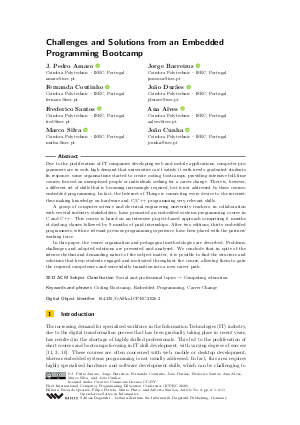Challenges and Solutions from an Embedded Programming Bootcamp
Authors
J. Pedro Amaro  ,
Jorge Barreiros
,
Jorge Barreiros  ,
Fernanda Coutinho
,
Fernanda Coutinho  ,
João Durães
,
João Durães  ,
Frederico Santos
,
Frederico Santos  ,
Ana Alves
,
Ana Alves  ,
Marco Silva
,
Marco Silva  ,
João Cunha
,
João Cunha 
-
Part of:
Volume:
First International Computer Programming Education Conference (ICPEC 2020)
Part of: Series: Open Access Series in Informatics (OASIcs)
Part of: Conference: International Computer Programming Education Conference (ICPEC) - License:
 Creative Commons Attribution 3.0 Unported license
Creative Commons Attribution 3.0 Unported license
- Publication Date: 2020-06-15
File

PDF
OASIcs.ICPEC.2020.2.pdf
- Filesize: 335 kB
- 11 pages
Document Identifiers
Subject Classification
ACM Subject Classification
- Social and professional topics → Computing education
Keywords
- Coding Bootcamp
- Embedded Programming
- Career Change
Metrics
- Access Statistics
-
Total Accesses (updated on a weekly basis)
0Document
0Metadata
Abstract
Due to the proliferation of IT companies developing web and mobile applications, computer programmers are in such high demand that universities can’t satisfy it with newly graduated students. In response, some organisations started to create coding bootcamps, providing intensive full-time courses focused on unemployed people or individuals seeking for a career change. There is, however, a different set of skills that is becoming increasingly required, but is not addressed by those courses: embedded programming. In fact, the Internet of Things is connecting every device to the internet, thus making knowledge on hardware and C/C++ programming very relevant skills. A group of computer science and electrical engineering university teachers, in collaboration with several industry stakeholders, have promoted an embedded systems programming course in C and C++. This course is based on an intensive project-based approach comprising 6 months of daylong classes followed by 9 months of paid internships. After two editions, thirty embedded programmers, with no relevant previous programming experience, have been placed with the partners’ working force. In this paper, the course organisation and pedagogical methodologies are described. Problems, challenges and adopted solutions are presented and analysed. We conclude that in spite of the intense rhythm and demanding nature of the subject matter, it is possible to find the structure and solutions that keep students engaged and motivated throughout the course, allowing them to gain the required competences and successfully transition into a new career path.
Cite As Get BibTex
J. Pedro Amaro, Jorge Barreiros, Fernanda Coutinho, João Durães, Frederico Santos, Ana Alves, Marco Silva, and João Cunha. Challenges and Solutions from an Embedded Programming Bootcamp. In First International Computer Programming Education Conference (ICPEC 2020). Open Access Series in Informatics (OASIcs), Volume 81, pp. 2:1-2:11, Schloss Dagstuhl – Leibniz-Zentrum für Informatik (2020)
https://doi.org/10.4230/OASIcs.ICPEC.2020.2
BibTex
@InProceedings{amaro_et_al:OASIcs.ICPEC.2020.2,
author = {Amaro, J. Pedro and Barreiros, Jorge and Coutinho, Fernanda and Dur\~{a}es, Jo\~{a}o and Santos, Frederico and Alves, Ana and Silva, Marco and Cunha, Jo\~{a}o},
title = {{Challenges and Solutions from an Embedded Programming Bootcamp}},
booktitle = {First International Computer Programming Education Conference (ICPEC 2020)},
pages = {2:1--2:11},
series = {Open Access Series in Informatics (OASIcs)},
ISBN = {978-3-95977-153-5},
ISSN = {2190-6807},
year = {2020},
volume = {81},
editor = {Queir\'{o}s, Ricardo and Portela, Filipe and Pinto, M\'{a}rio and Sim\~{o}es, Alberto},
publisher = {Schloss Dagstuhl -- Leibniz-Zentrum f{\"u}r Informatik},
address = {Dagstuhl, Germany},
URL = {https://drops.dagstuhl.de/entities/document/10.4230/OASIcs.ICPEC.2020.2},
URN = {urn:nbn:de:0030-drops-122896},
doi = {10.4230/OASIcs.ICPEC.2020.2},
annote = {Keywords: Coding Bootcamp, Embedded Programming, Career Change}
}
Author Details
References
-
J. Pedro Amaro, Jorge Barreiros, Fernanda Coutinho, João Durães, Frederico Santos, Ana Alves, Marco Silva, and João Cunha. Embedded programming bootcamp for career change. In AmiES - International Symposium on Ambient Intelligence and Embedded Systems, Coimbra, Portugal, 2019.

-
R. Barry. FreeRTOS reference manual: API functions and configuration options. Real Time Engineers Limited, 2009.

-
Sonal Dekhane, Kristine Nagel, and Nannette Napier. Summer programming boot camp: A strategy for retaining women in it. In Proc. 46th ACM Technical Symposium on Computer Science Education, SIGCSE ’15, page 678, NY, USA, 2015. Association for Computing Machinery.

-
B. Kernighan and D. Ritchie. C Programming Language. Prentice-Hall, USA, 1978.

-
Edward Ashford Lee and Sanjit Arunkumar Seshia. Introduction to Embedded Systems: A Cyber-Physical Systems Approach. The MIT Press, 2nd edition, 2016.

-
I. Scott MacKenzie. 8051 Microcontroller. Prentice Hall PTR, USA, 3rd edition, 1998.

-
Muhammad Ali Mazidi, Shujen Chen, and Eshragh Ghaemi. STM32 Arm Programming for Embedded Systems (Volume 6). MicroDigitalEd.com, 2018.

-
Ian Sommerville. Software Engineering. Addison-Wesley Publishing, USA, 2010.

-
Bjarne Stroustrup. C++ Programming Language. Addison-Wesley Professional, 2013.

-
Kyle Thayer and Andrew J. Ko. Barriers faced by coding bootcamp students. In Proceedings of the 2017 ACM Conference on International Computing Education Research, ICER ’17, page 245–253, NY, USA, 2017. Association for Computing Machinery.

-
Yu-Cheng Tu, Gillian Dobbie, Ian Warren, Andrew Meads, and Cameron Grout. An experience report on a boot-camp style programming course. In 49th ACM Technical Symposium on Computer Science Education, SIGCSE ’18, NY, USA, 2018. Association for Computing Machinery.

